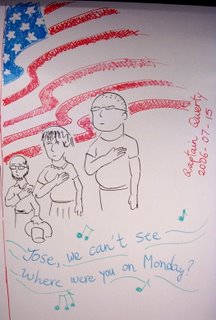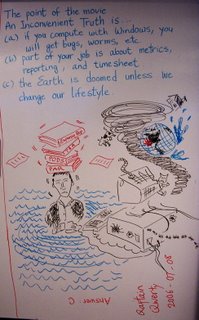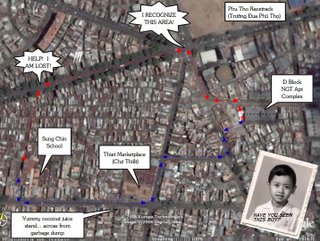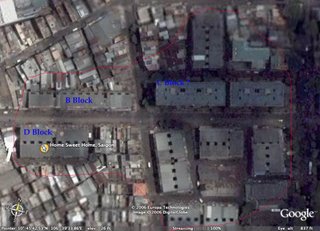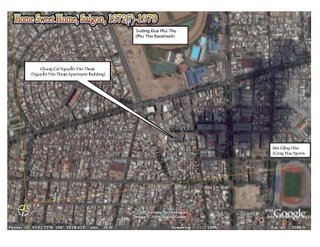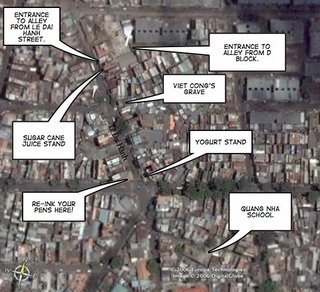
While living at D Block of NVT Apartment Complex, I spent most of my school days at Quang Nha school. I was there until the fifth grade, but I sort of dropped out of school to leave Viet Nam for the open sea.
My walk to school would start at the alleyway entrance on the D block side. I am surprised to see, according to Google Earth's satellite image, that the houses are so neatly laid out. From what I remember, the path is winding, dark, and is mostly dirt, i.e. not paved. Eventually, I would end up at the alley entrance on the side of Le Dai Hanh Street. I don't recall what I normally had for breakfast before going to school, but maybe since we go home for lunch, on the way back for the afternoon session, I would sometimes stop at the sugar cane juice stand. Popular in Viet Nam back then, there were these juice stands that feature an electrical mill that squeezed the juice out of the sugarcane sticks as they were fed into the mill's two turning cylinders. Adding a slice of durian or orange made the drink extra delicious.
Next I would pass the Viet Cong's Grave, a huge mount of dirt whose outside layer had dried. I do recall seeing incenses and offerings in front of the grave every now and then, although of course we kids were told not to be near so as to avoid having our spirits taken away by the Viet Cong's ghost. BTW, Viet Cong is the Vietnamese equivalent of Vietnamese Communist. Closer to the school, I would pass the yogurt stand, or actually, I think it was more of a cafe, complete with tables and chairs for its patrons. We are talking about non-flavor yogurt, the really sour stuff, none of that fruit-on-the-bottom kind of thing. Yet, it was a novelty then and I loved it. I think they were even served in ice cream glasses.
Across from the yogurt place, there was this small business that I still find fascinating. Nowadays, when you use up all the ink in a ballpoint pen - if you still use a pen to start with - you throw away the whole thing, right? Or if you are the more environmental conscious type, you refill the inside with a new tube. Back in 1970's Viet Nam, there was this cottage industry of refilling pens. You bring over your spent pen, the man would use some kind of needle to remove the ball from the tip of the pen - yup, that's why they call it ballpoint pen, I suppose. Then from the other end he would insert a piece of cottonball and push it along the length of the tube out the other end, to clean the old ink, of course. He may do it a few times to have the tube totally clean, then he would put the ball back on, inject some ink, put everything back together, and voila, you have a shiny new pen! I wonder if such service still exists in today's Viet Nam.
Anyway, cross the big avenue and I would be mere steps from Quang Nha school. Again, to reach the school, I actually had to turn into some alley. Because of the alley's proximity to the school, there were usually many food stalls at the entrance of the alley, offering the students breakfasts or snacks. One of the carts offered a game of chance - you spinned a wheel and depending on where it landed, you could win a glass bottle of soda or the money equivalent.
With the soda cart, I have a regret that I still remember till this day. One of the guys I played with, a neighbor from D Block as a matter of fact, called Quan, one day helped me win a game. I opted for the money and pocketed the whole thing! Later on, an older student in the group told me I should have split the money with Quan. I don't recall thinking much of my goof but I know I do now. Quan and I were both about ten years old, maybe eleven, and expressing our feelings weren't probably not our strong suits, so I cannot tell if I hurt his feelings or not, or at least alienated him as a friend. We still played together after my "cheap" incident, but it's an incident I still remember even now.
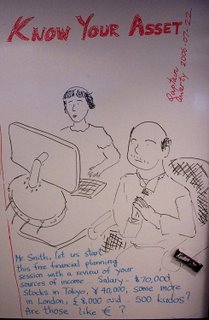 Let us take a break from oppressive Communist economy and re-visit our American entrepreneurship, or at least an attempt at it...
Let us take a break from oppressive Communist economy and re-visit our American entrepreneurship, or at least an attempt at it...